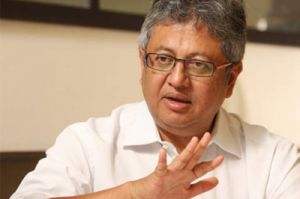When despair reigns
Extremism and injustice cannot be overcome by responding with similar extreme and militant action.
Zaid Ibrahim
IF you have been following the stories of young jihadists from Britain and Malaysia fighting in Syria or Iraq, you would have probably found a common thread that runs through all their narratives: despair.
Almost all of them alluded to the suffering of Muslims in the Middle East, none of which has drawn any help from the outside world. Millions of Palestinians, Syrians and Iraqis have been displaced while their loved ones have been killed and their homes destroyed.
No one – not even the world’s self-appointed protector of human rights and justice called the United States of America – has found it necessary to put up a concerted political effort to put an end to all this suffering.
These young Muslims come from comfortable homes and safe environments in their respective countries and cannot possibly end these wars and the killings by their actions. But in an interview with Al Jazeera, one of them expressed his intentions well.
He is not a militant out to destroy the world and he would not do anything to harm his homeland, England. He is unsure if his actions will lead to a peaceful solution, but what else can he do to stop the carnage?
Like many others, he is desperate to help, especially since none seems to be forthcoming from the international community. International militancy is on the rise because we have allowed despair to reign.
Malaysia is fortunate enough to be a reasonably wealthy country and our people, despite recent price increases, are not in a dire economic situation.
However, in this borderless world where social media exposes everyone to injustices and the suffering of their fellow Muslims elsewhere, often just minutes after the latest calamity, they feel the pain and the despair in the killing zones.
They don’t need to be there to imagine the anguish of losing their loved ones and their homes. Young men and women who have decided to join this international militant brigade are part of a new breed of fighters who are seeking some kind of fairness in the world order. Malaysia is not insulated from this feeling.
I am certainly not providing justification for young men to go to war in foreign lands and lose their lives in the process. Extremism and injustice cannot be overcome by responding with similar extreme and militant action. War and killings do not end conflicts in most cases – they only prolong them.
However, it’s important for us to recognise that the plight of Muslims worldwide has an immediate impact on young Muslims in Muslim countries, Malaysia included.
If we don’t want them to take up arms and wade into the killing fields, then the country and our leaders must be able to make them believe that there are other options that can be pursued at home.
These peaceful options can be translated into something meaningful in their quest to help suffering Muslims elsewhere. For a start, why not position Malaysia as a main player in the world of diplomacy involving Muslim countries?
Since we are friendly with the superpowers and pride ourselves as an exemplary Muslim country, this will give us the credentials to play an active international role in disputes and conflict resolution.
As former Indonesian president Abdurrahman Wahid (Gus Dur) once said, why should Arab countries be leading the Muslim world when Muslim countries in the region are more suited, being the most populous and democratic?
Diplomacy has its limits of course, but a more direct and stronger advocacy in our foreign affairs for the fair treatment of Muslims worldwide is one way to convince our young that the country is with them.
For instance, our commitment to see the establishment of the Palestinian state and to end the Israeli Government’s illegal occupation and air strikes in Gaza must not come out in dribs and drabs.
We need to do more. Get our top diplomats to be posted in Palestine, Iraq, Syria, Iran, Lebanon, Jordan, Turkey, Myanmar and China.
They, of course, would prefer to be stationed in London, New York, Tokyo and Paris for obvious reasons, but the country has to reposition itself in world politics if we want to curb Islamic militancy at home.
We have to accept that all Muslim communities are on the boil and unless we manage ours well, we will pay a heavy price.
We need to consistently mobilise world opinion and the resources of other Muslim countries to help the Palestinian people, as well as the Muslim minorities in countries we have strong diplomatic relations with.
If we can try to seek an end to the political infighting in Arab countries, then that would be a huge contribution.
These diplomats must realise that the comforts of London and New York will not save the country from militancy unless they too are prepared to feel the pain and suffering of their brothers in Palestine, Syria Jordan and Iraq.
Washington and London are useful, but let’s not forget where blood is being spilled.
If Malaysia can show its dedication and commitment to redressing the injustices against Muslims, especially in the Middle East, then that will comfort many young Muslims here that they are not alone, and that others do care about their grievances. Comfort will replace despair, and hopefully the mind will change.
Edicts do not mean much these days, even if they come from the top religious authorities.


